Joss Whedon | 141 mins | Blu-ray | 2.40:1 | USA / English | 12 / PG-13
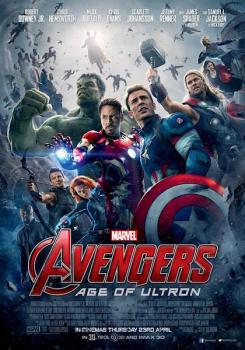 It feels kind of pointless reviewing Avengers: Age of Ultron, the written-and-directed-by Joss Whedon (and, infamously, reshaped-in-the-edit-by committee) follow-up to 2012’s “third most successful film of all time” mega-hit
It feels kind of pointless reviewing Avengers: Age of Ultron, the written-and-directed-by Joss Whedon (and, infamously, reshaped-in-the-edit-by committee) follow-up to 2012’s “third most successful film of all time” mega-hit The Avengers Marvel’s The Avengers Avengers Assemble Marvel Avengers Assemble. In terms of consumer advice, you’re not going to watch this sequel without having seen the first, and therefore “more of the same (more or less)” will suffice for a review. In terms of a more analytical mindset… well, what is there to analyse, really? I’m not sure this movie has anything to say. “Of course it doesn’t, it’s a blockbuster,” you might counter, which I think is unfair to blockbusters. Not to this one, though. Nonetheless, I have a few thoughts I shall share regardless.
Firstly: Marvel’s initially-stated goal of keeping each of their film series separate enough that you don’t need to watch them all has clearly gone out the window by this point. Okay, you really needed a fair bit of knowledge from The First Avenger and Thor to fully understand Avengers Assemble (indeed, as I noted at the time, that first team-up movie is practically Thor 2), but I reckon you could get by without. In between, things have got worse: jumping from any of the pre-Avengers films to their post-Avengers sequel without viewing the team-up movie renders them semi-nonsensical, and now swathes of Age of Ultron make little sense without at least having seen Captain America: The Winter Soldier, which fundamentally shifted the status quo of the Marvel Cinematic Universe.
That’s not all, though, because Age of Ultron is also concerned with setting up the future. Far from being self-contained, there’s heavy-handed set-up for Avengers 2.5: Civil War Captain America: Civil War, Thor: Ragnarok, and the two-part Avengers: Infinity War.  Even though the first half of that is still three years away, we’re still very much on the road to it. Heck, we have been practically since the MCU began, thanks to those frickin’ stones (if you don’t know already, don’t expect me to explain it to you), but now it’s overt as well as laid in fan-friendly easter eggs. The titular threat may rise and be put down within the confines of Age of Ultron’s near-two-and-a-half-hour running time, but no such kindness is afforded to the myriad subplots.
Even though the first half of that is still three years away, we’re still very much on the road to it. Heck, we have been practically since the MCU began, thanks to those frickin’ stones (if you don’t know already, don’t expect me to explain it to you), but now it’s overt as well as laid in fan-friendly easter eggs. The titular threat may rise and be put down within the confines of Age of Ultron’s near-two-and-a-half-hour running time, but no such kindness is afforded to the myriad subplots.
Said threat is Ultron, a sentient robot born of Tony Stark’s work, who seeks to make the world a better place by obliterating humanity. As played by James Spader, it seems like Whedon has created a villain in his own image. Oh sure, every character speaks a little bit Whedon-y, but Ultron’s speech pattern, syntax, tone, and sense of humour is often reminiscent of how Whedon himself sounds in interviews; and if you told me Spader was doing a Joss Whedon impression for the voice, I’d believe you. Considering the well-publicised behind-the-scenes wrangles the film went through, especially in post-production, it does make you wonder how conscious it was — Whedon casting himself as a villain with good intentions who’d like to destroy the Avengers. Something like that, anyway.
A behind-the-scenes story Marvel Studios are more keen to emphasise is how they did a lot of real-world-related stunts for real, like in the Seoul bike/truck/Quinjet chase, for instance (you know, the one where Black Widow is on the bike in the film but controversially not in the toy because of the “no girl toys!” rule). Behind-the-scenes features on the film’s Blu-ray detail the extent they want to in closing down real locations, performing dangerous or hard-to-achieve stunts, and so on and so forth. You have to wonder why they bothered, because there’s so much CGI all over the place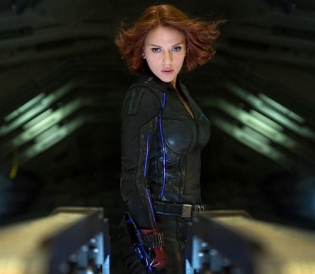 (not just obvious stuff like the Hulk, but digital set extensions, fake location work, even modifying Stark’s normal Audi on a normal road because it was a future model that wasn’t physically built when filming) that stuff they genuinely did for real looks computer generated too. All that time, all that effort, all that epic logistical nightmare stuff like shutting down a capital city’s major roads for several days… and everyone’s going to assume some tech guys did it in an office, because that’s what it looks like. If you’re going to go to so much trouble to do it for real, make sure it still looks real by the time you get to the final cut. I’ll give you one specific example: Black Widow weaving through traffic on a motorbike in Seoul. I thought it was one of the film’s less-polished effects shots. Nope — done for real, and at great difficulty because it’s tough to pull off a fast-moving bike speeding through fast-moving cars. What a waste of effort!
(not just obvious stuff like the Hulk, but digital set extensions, fake location work, even modifying Stark’s normal Audi on a normal road because it was a future model that wasn’t physically built when filming) that stuff they genuinely did for real looks computer generated too. All that time, all that effort, all that epic logistical nightmare stuff like shutting down a capital city’s major roads for several days… and everyone’s going to assume some tech guys did it in an office, because that’s what it looks like. If you’re going to go to so much trouble to do it for real, make sure it still looks real by the time you get to the final cut. I’ll give you one specific example: Black Widow weaving through traffic on a motorbike in Seoul. I thought it was one of the film’s less-polished effects shots. Nope — done for real, and at great difficulty because it’s tough to pull off a fast-moving bike speeding through fast-moving cars. What a waste of effort!
Effort invested elsewhere has been better spent, however. For instance, this is a Joss Whedon movie, so we all know somebody has to die. Credit to Whedon, then, for investing in a thorough attempt at misdirection. He goes all-out to imply that (spoiler!) the bucket shall be kicked by Hawkeye: the archer has suddenly got a bigger role; we get to meet his family; every time there’s a montage and someone starts discussing sacrifice or the inevitability that they won’t all survive, it’s Barton who’s on screen; he’s the most sacrificeable Avenger anyway, the only one with neither his own movie nor fan demand for one; and Jeremy Renner’s dissatisfaction with the role he got in Avengers 1 has been well documented. If anything he goes too far in that direction — it’s so obvious Hawkeye’s for the chop that it’s not wholly surprising when there’s a ‘twist’ and (bigger spoiler!) the even-more-dispensable Pietro Maximoff (he apparently has just seven lines in the entire film) is the one who make The Ultimate Sacrifice. Which is… neither here nor there, really.
 The really daft thing is, Whedon specifically added Scarlet Witch and Quicksilver… wait, are Marvel allowed to call them that? I forget. Anyway, Whedon added the Maximoff twins because, as he said himself, “their powers are very visually interesting. One of the problems I had on the first one was everybody basically had punchy powers.” I know Hawkeye’s power is more shoot-y than punchy, and we all know X-Men used the silver speedster even better, but still… Well, I guess it’s not his problem anymore. Nor is the fact the film ends with a radically new status quo, including most of the big-name heroes having sodded off to leave a 66%-replaced Avengers line-up… which will be completely shattered almost instantly in next year’s Captain America: Basically The Avengers 3. But hey, nothing lasts forever, right? Or even a whole movie, it would seem.
The really daft thing is, Whedon specifically added Scarlet Witch and Quicksilver… wait, are Marvel allowed to call them that? I forget. Anyway, Whedon added the Maximoff twins because, as he said himself, “their powers are very visually interesting. One of the problems I had on the first one was everybody basically had punchy powers.” I know Hawkeye’s power is more shoot-y than punchy, and we all know X-Men used the silver speedster even better, but still… Well, I guess it’s not his problem anymore. Nor is the fact the film ends with a radically new status quo, including most of the big-name heroes having sodded off to leave a 66%-replaced Avengers line-up… which will be completely shattered almost instantly in next year’s Captain America: Basically The Avengers 3. But hey, nothing lasts forever, right? Or even a whole movie, it would seem.
Other people’s opinions, and the expectations they foster, have a lot to answer for when you first watch these films months after release. I found the first Avengers to be massively overrated — only sporadically fun; not that funny; in places, really quite awkward, or even dull. I couldn’t really enjoy it; it just was. This sequel, on the other hand… isn’t underrated, but comes with so much negative, niggly baggage that, with lowered expectations, I was able to just enjoy it on a first viewing. I found it funnier than the first; I thought the characters and their relationships were smoother. It’s still flawed (the Thor arc is clearly bungled; the climax is too much; stuff they did for real, at great expense and difficulty, looks like CGI; and so on), but no more than the first one. I think people’s over-hyped memories make them think it’s worse than it is by comparison. Then again, there’s no accounting for taste — there are definitely things people have criticised about the movie (the level and style of humour; the focus given to Hawkeye) that were actually among my favourite parts.
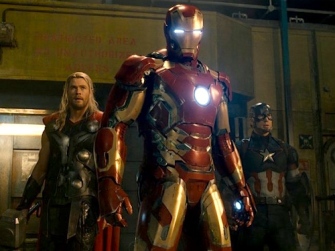 At the end of the day, what does it matter? Age of Ultron isn’t so remarkably good — nor did it go down so remarkably poorly — that it deserves a reevaluation someday. It just is what it is: an overstuffed superhero epic, which has too much to do to be able to compete with its comparatively-simple contributing films on quality grounds, but is entertaining enough as fast-food cinema. Blockbusterdom certainly has worse experiences to offer.
At the end of the day, what does it matter? Age of Ultron isn’t so remarkably good — nor did it go down so remarkably poorly — that it deserves a reevaluation someday. It just is what it is: an overstuffed superhero epic, which has too much to do to be able to compete with its comparatively-simple contributing films on quality grounds, but is entertaining enough as fast-food cinema. Blockbusterdom certainly has worse experiences to offer.

Avengers: Age of Ultron is on Sky Movies Premiere from Boxing Day.
This review is part of the 100 Films Advent Calendar 2015. Read more here.

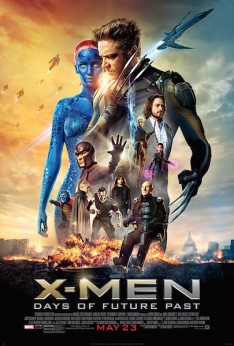 I think I’ve previously discussed my life-long love of the X-Men franchise, so I shan’t go into detail again, but suffice to say Days of Future Past has been one of my most-anticipated movies ever since the title (which is that of a classic and influential story from the comics) was announced. Thank goodness, then, that the final result doesn’t disappoint.
I think I’ve previously discussed my life-long love of the X-Men franchise, so I shan’t go into detail again, but suffice to say Days of Future Past has been one of my most-anticipated movies ever since the title (which is that of a classic and influential story from the comics) was announced. Thank goodness, then, that the final result doesn’t disappoint.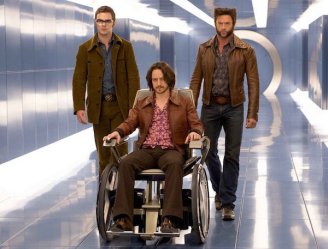 Beyond that, there’s the characters: the younger versions are having to deal with the fall-out from
Beyond that, there’s the characters: the younger versions are having to deal with the fall-out from  Not everyone gets to shine in a cast this big, although pretty much everyone gets a moment. The future-set cast have the least to do, people like Halle Berry turning up to do little more than show their face, though Stewart and McKellen get a moment or two worthy of their talents. After he was the focus of the last film, Fassbender is slightly shortchanged here; but after McAvoy gave him essential support in First Class, Fassbender plays the same service here, informing Charles’ journey. Of the new additions, Evan Peters as Quicksilver (that’s the one who’ll also be played by Aaron Taylor-Johnson in
Not everyone gets to shine in a cast this big, although pretty much everyone gets a moment. The future-set cast have the least to do, people like Halle Berry turning up to do little more than show their face, though Stewart and McKellen get a moment or two worthy of their talents. After he was the focus of the last film, Fassbender is slightly shortchanged here; but after McAvoy gave him essential support in First Class, Fassbender plays the same service here, informing Charles’ journey. Of the new additions, Evan Peters as Quicksilver (that’s the one who’ll also be played by Aaron Taylor-Johnson in  Later, there’s the aforementioned ‘slow-mo’ sequence, and the grand climax, which offers more “fly something big around” antics a la First Class’ submarine, only considerably grander. Yet for all the spectacle, the final moments once again come down to character: what is Magneto prepared to do? What is Mystique prepared to do? Will anyone listen to Charles? And so on. Even the much-vaunted Marvel Studios movies tend to base their climaxes in slabs of ‘epic’ CGI crashing into each other; Days of Future Past does that for a bit, then brings the characters back into focus for the real final beats.
Later, there’s the aforementioned ‘slow-mo’ sequence, and the grand climax, which offers more “fly something big around” antics a la First Class’ submarine, only considerably grander. Yet for all the spectacle, the final moments once again come down to character: what is Magneto prepared to do? What is Mystique prepared to do? Will anyone listen to Charles? And so on. Even the much-vaunted Marvel Studios movies tend to base their climaxes in slabs of ‘epic’ CGI crashing into each other; Days of Future Past does that for a bit, then brings the characters back into focus for the real final beats.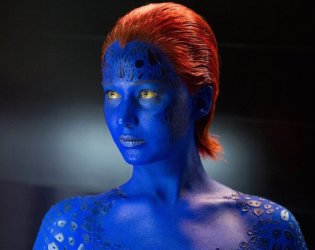 (Jennifer Lawrence being the third pillar of the past triumvirate, as they’ve already focused on Xavier and Magneto). While Days of Future Past does wrap up the majority of its threads (the open-ended ones are answered by previous films, if you want them to be), there’s plenty there to play with in the next film (and, perhaps, ones beyond that) if they want to… which they do.
(Jennifer Lawrence being the third pillar of the past triumvirate, as they’ve already focused on Xavier and Magneto). While Days of Future Past does wrap up the majority of its threads (the open-ended ones are answered by previous films, if you want them to be), there’s plenty there to play with in the next film (and, perhaps, ones beyond that) if they want to… which they do.